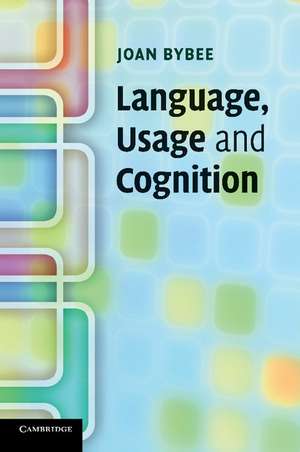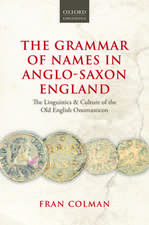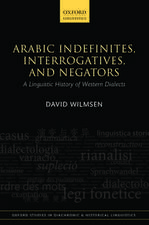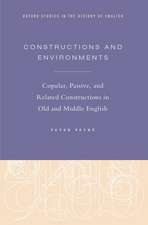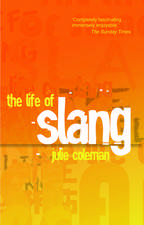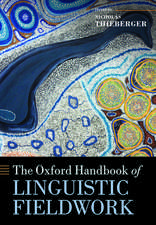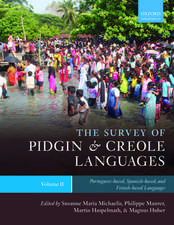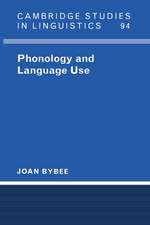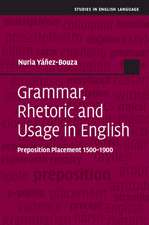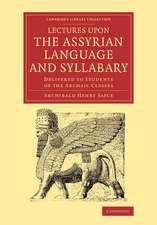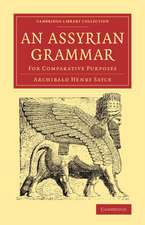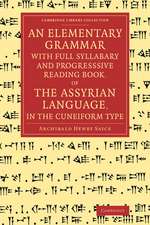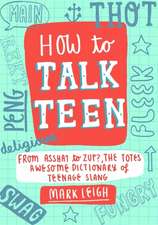Language, Usage and Cognition
Autor Joan Bybeeen Limba Engleză Paperback – 31 mar 2010
| Toate formatele și edițiile | Preț | Express |
|---|---|---|
| Paperback (1) | 417.64 lei 6-8 săpt. | |
| Cambridge University Press – 31 mar 2010 | 417.64 lei 6-8 săpt. | |
| Hardback (1) | 698.61 lei 6-8 săpt. | |
| Cambridge University Press – 31 mar 2010 | 698.61 lei 6-8 săpt. |
Preț: 417.64 lei
Nou
Puncte Express: 626
Preț estimativ în valută:
79.93€ • 83.14$ • 65.98£
79.93€ • 83.14$ • 65.98£
Carte tipărită la comandă
Livrare economică 14-28 aprilie
Preluare comenzi: 021 569.72.76
Specificații
ISBN-13: 9780521616836
ISBN-10: 0521616832
Pagini: 264
Ilustrații: 8 b/w illus. 33 tables
Dimensiuni: 152 x 228 x 13 mm
Greutate: 0.41 kg
Editura: Cambridge University Press
Colecția Cambridge University Press
Locul publicării:Cambridge, United Kingdom
ISBN-10: 0521616832
Pagini: 264
Ilustrații: 8 b/w illus. 33 tables
Dimensiuni: 152 x 228 x 13 mm
Greutate: 0.41 kg
Editura: Cambridge University Press
Colecția Cambridge University Press
Locul publicării:Cambridge, United Kingdom
Cuprins
1. A usage-based perspective on language; 2. Rich memory for language: exemplar representation; 3. Chunking and degrees of autonomy; 4. Analogy and similarity; 5. Categorization and the distribution of constructions in corpora; 6. Where do constructions come from? Synchrony and diachrony in a usage-based theory; 7. Grammatical change: reanalysis or the gradual creation of new constructions?; 8. Gradient constituency and gradual reanalysis; 9. Conventionalization and the local vs. the general: modern English can; 10. Exemplars and grammatical meaning: the specific and the general; 11. Language as a complex adaptive system: the interaction of cognition, culture and use.
Recenzii
'It used to be a cliché that humans understand new utterances by constructing analogies with previous utterances. A fully-fledged articulation of this idea was however lacking until now. Bybee does a marvellous job in bringing together linguistics and cognitive science, showing how the integration of usage and analogy results in an improved account for language cognition.' Rens Bod, Institute for Logic, Language and Computation, University of Amsterdam
'… the perfect overview for anyone wanting to learn about the usage-based approach to language, and a synthesis that will be valuable to readers familiar with the framework.' Kie Ross Zuraw, Department of Linguistics, University of California, Los Angeles
'Comprehensive and compelling … it should not be missed by anyone interested in language and the processes that underlie both language change and language processing.' Adele E. Goldberg, Professor of Linguistics, Princeton University
'Bybee's insightful and refreshing investigation into the dynamic processes that create grammar is an inspiration for research in usage-based linguistics.' Sandra A. Thompson, University of California, Santa Barbara
'… this is a very insightful and informative book which provides a good overview of Bybee's impressive investigations and which always integrates diachronic perspective.' Damaris Nübling, Language and Dialogue
'… the perfect overview for anyone wanting to learn about the usage-based approach to language, and a synthesis that will be valuable to readers familiar with the framework.' Kie Ross Zuraw, Department of Linguistics, University of California, Los Angeles
'Comprehensive and compelling … it should not be missed by anyone interested in language and the processes that underlie both language change and language processing.' Adele E. Goldberg, Professor of Linguistics, Princeton University
'Bybee's insightful and refreshing investigation into the dynamic processes that create grammar is an inspiration for research in usage-based linguistics.' Sandra A. Thompson, University of California, Santa Barbara
'… this is a very insightful and informative book which provides a good overview of Bybee's impressive investigations and which always integrates diachronic perspective.' Damaris Nübling, Language and Dialogue
Notă biografică
Descriere
Outlines a theory of language use and language change, focusing on the processes that give languages their structure and variance.
